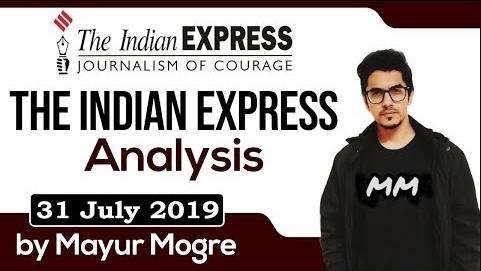Table of Contents
- Startups
- Using iris and fingerprint
- Designation an individual terrorist
Startups


Using iris and fingerprint
- The Automated Multi-modal Biometric Identification System (or AMBIS) adopted by the Maharashtra Police will soon be replicated across the country.
- Using iris and fingerprint

- It also includes a portable system to dust off and capture fingerprints from crime scenes.
- With the integration of the system with facial recognition from CCTV cameras, AMBIS enables the police to cross-reference and put faces to criminals whose fingerprints have been captured on paper over the decades, apart from solving fresh crimes.
- AMBIS replaces the Automated Fingerprint Identification System (AFIS), which has been used by Indian law enforcement agencies to search finger and palm prints.
- However, AFIS has limited utility, providing only one-to-one fingerprint matches as compared multimodal matches possible with AMBIS.
- With facial recognition technology, the new system is also an upgrade on AFIS.
- Indian authorities first thought of digitising fingerprints in 2015 when they were trying to gain custody of gangster Chhota Rajan in Indonesia.
- The Mumbai Police’s dossier against Rajan lacked the record of his fingerprint, which was captured in the 1980s.
- Even though the police could piece together Rajan’s fingerprint from a torn paper in Chembur’s Tilak Nagar police station, the episode underscored the need to digitise fingerprint records.
- The Maharashtra Cyber Department studied models used by the Federal Bureau of Investigation, the Central Intelligence Agency and the Department of Homeland Security in the United States, and the Interpol, before formulating its own requirements.
- Eventually, the French company that had designed the Interpol’s biometric and facial recognition system was awarded the tender to set up AMBIS
Pilot project
- Before Monday’s formal launch, the system was introduced at select police stations in Mumbai that have upgraded tech infrastructure such as the Crime and Criminal Tracking Network and System (CCTNS).
Present condition
- According to Rajput, the older data is being continuously worked upon to increase accuracy and resemble the highquality prints now recorded using AMBIS.
- Thus far, Mumbai Police have cracked 85 cases of theft and housebreaks dating back to 2014 after matching prints dusted from the scenes of crime with those digitised.
- The system is expected to be of help in more serious offences as its accuracy improves and the database expands.
Designation an individual terrorist
- The Unlawful Activities Prevention Amendment (UAPA) Bill is an anti-terror legislation that seeks to designate an individual as a “terrorist”.
- On July 24, Lok Sabha cleared the changes to the existing law, but Opposition parties and civil liberties lawyers have criticised the Bill, arguing it could be used to target dissent against the government, and infringe on citizens’ civil rights.
Who is a “terrorist” in the Bill?
- The words “terror” or “terrorist” are not defined, but the UAPA Bill in Section 15 defines a “terrorist act” as any act committed with intent to threaten or likely to threaten the unity, integrity, security, economic security, or sovereignty of India or with intent to strike terror or likely to strike terror in the people or any section of the people in India or in any foreign country.


- if they are found committing, preparing for, promoting, or involved in an act of terror
- A similar provision already exists in Part 4 and 6 of the legislation for organisations that can be designated as a “terrorist organisation”
How are individuals declared terrorists?
- At present, in line with the legal presumption of an individual being innocent until proven guilty, an individual who is convicted in a terror case is legally referred to as a terrorist, while those suspected of being involved in terrorist activities are referred to as terror accused.
- The Bill does not clarify the standard of proof required to establish that an individual is involved or is likely to be involved in terrorist activities.
- The central government may designate an individual as a terrorist through a notification in the official gazette, and add his name to the schedule supplemented to the UAPA Bill.
- The government is not required to give an individual an opportunity to be heard before such a designation.
What happens when an individual is declared a terrorist?
- The designation of an individual as a global terrorist by the United Nations is associated with sanctions including travel bans, freezing of assets and an embargo against procuring arms. The UAPA Bill, however, does not provide any such detail.
- The Bill also does not require the filing of cases or arresting individuals while designating them as terrorists. According to Home Ministry officials, the consequences will be prescribed in the Rules supplemented to the law once the amendment Bill is passed.
- The Bill also seeks to give the central government the power to remove a name from the schedule when an individual makes an application. The procedure for such an application and the process of decision-making will also be decided by the central government.
What happens when an individual is declared a terrorist?
- If an application filed by an individual declared a terrorist is rejected by the government, the Bill gives him the right to seek a review within one month after the application is rejected.
- Under the amendment Bill, the central government will set up the review committee consisting of a chairperson (a retired or sitting judge of a High Court) and three other members. The review committee will be empowered to order the government to delete the name of the individual from the schedule that lists “terrorists”, if it considers the order to be flawed
- Apart from these two avenues, the individual can also move the courts challenging the government’s order.
What are the other major changes proposed in the UAPA Bill?
- The existing UAPA law requires an investigating officer to take prior permission of the Director General of Police of a state for conducting raids, and seizing properties that are suspected to be linked to terrorist activities.
- The amendment Bill, however, removes this requirement if the investigation is conducted by an officer of the National Investigation Agency (NIA).
- The investigating officer, under the Bill, only requires sanction from the Director General of NIA.
What are the other major changes proposed in the UAPA Bill?
- The existing UAPA law specifies that only officers of the rank of Deputy Superintendent or Assistant Commissioner of Police of the NIA shall have the power to investigate offences under the UAPA law.
- The Bill seeks to allow NIA officers of Inspector rank to carry out investigations.
TOI 270
- Dwarf Star
- Discovered by NASA’s TESS
- 73 light years away
- 40% smaller than Sun
- TOI 270 B,C,D orbit star
- Thick atmosphere
Download Free PDF – The Indian Express Analysis

























 WhatsApp
WhatsApp